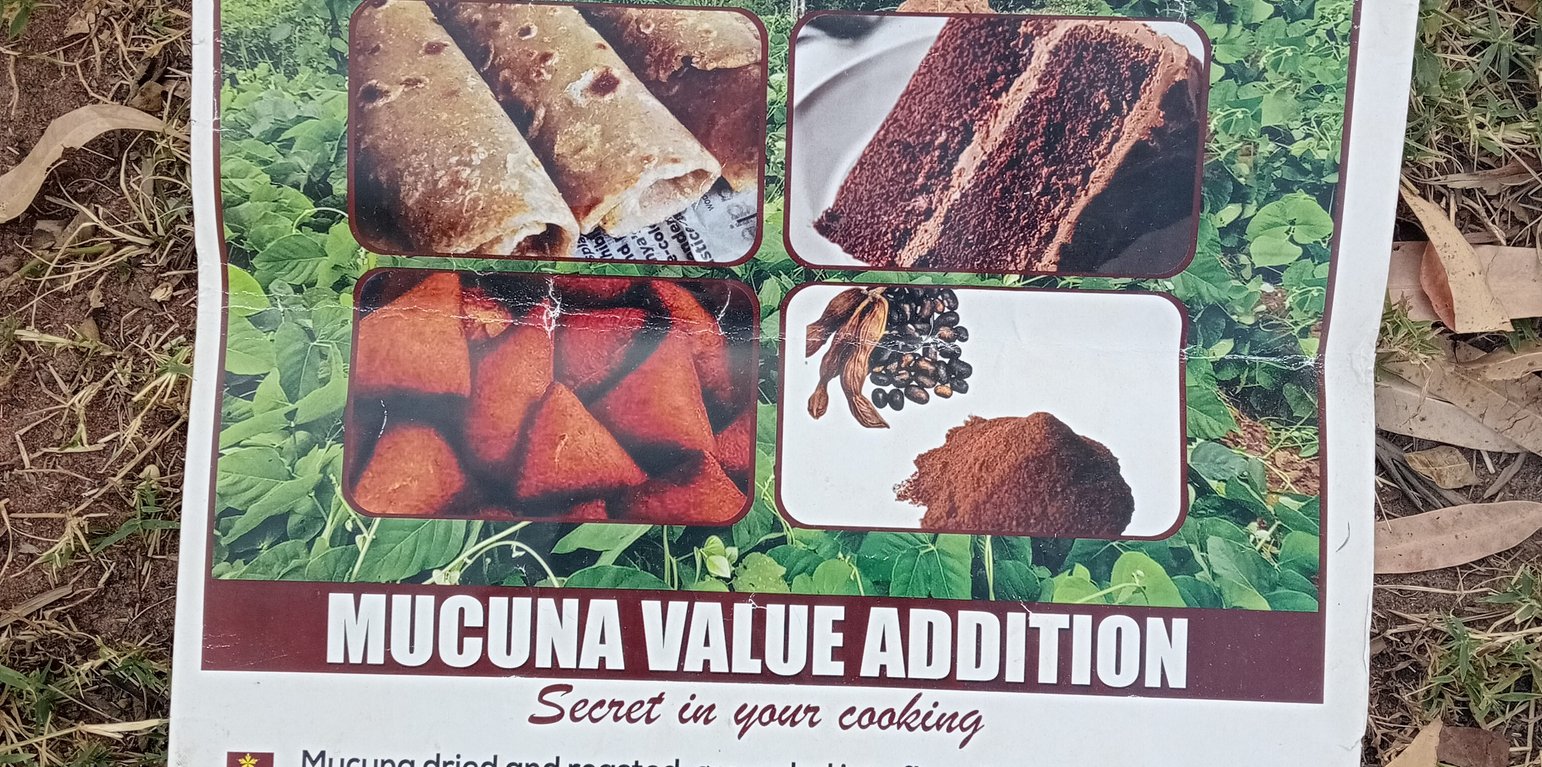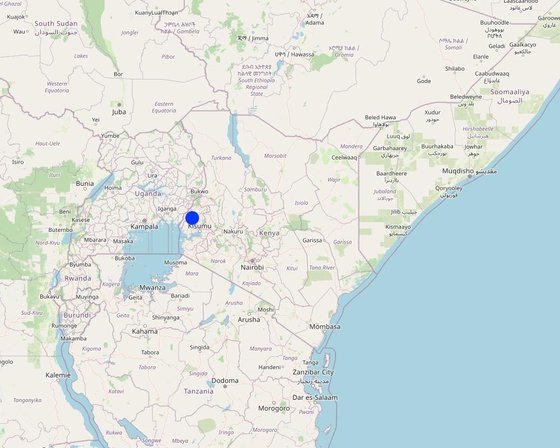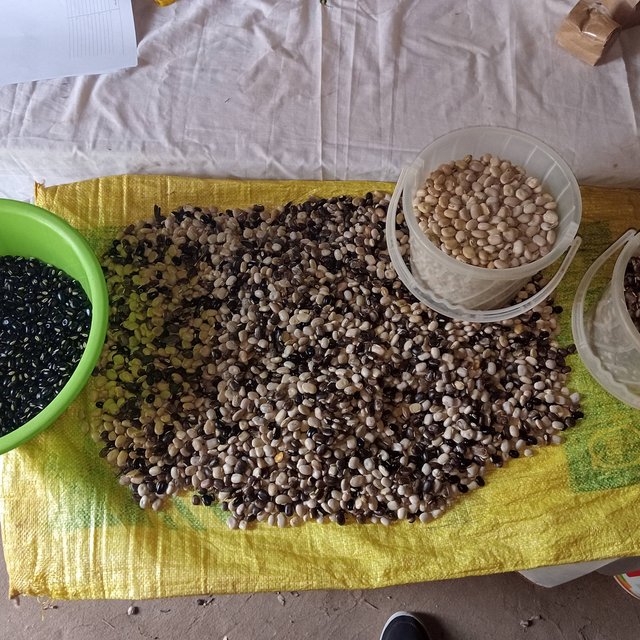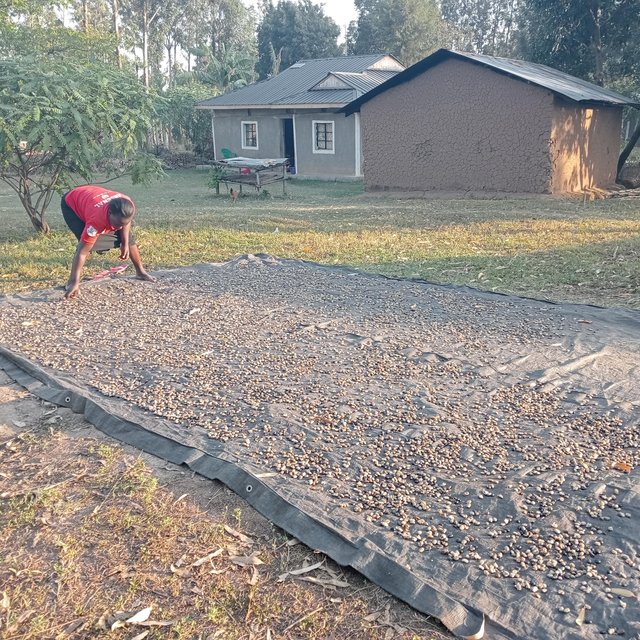



Mucuna pruriens (velvet bean) is tropical legume that is widely known for its ability to rehabilitate soils by increasing organic matter. Unlike many other legumes of the bean family, mucuna seeds (beans) are not very palatable. In addition, raw and unprepared mucuna beans can cause severe digestive disorders. However, due to its emerging health and economic benefits, many farmers are now adopting the crop. Consequently, the crop is simultaneously helping in soil conservation by controlling soil erosion and improving soil structure alongside suppressing weeds.
Promoting the economic benefits of mucuna through value addition is a key factor in ensuring farmers adopt mucuna as a conservation agriculture crop. Mucuna value addition involves various stages of beans preparation/ treatment aimed at reducing the potential of L-DOPA toxicity. The ProSoil project promoted the uptake of mucuna as a green manure cover crop by training farmers on mucuna bean value-addition. In Matungu area of Kakamega County, Kenya, the ProSoil project partnered with a local farmer-based self-help group, Tunza Udongo Self Help Group [‘tunza udongo’ is a Kiswahili phrase for ‘take care of the soil’] which facilitated the convening women farmers. The project facilitated specialists in mucuna value addition from the Ministry of Agriculture who trained the farmers.
To spread this approach, the trained farmers train other farmers. In addition to the training in mucuna value-addition, the farmers were informed about the ecological and economic importance of mucuna and its propagation. The ProSoil project (GIZ and WHH) and Ministry of Agriculture invite the farmers to events such as farmer field days where they can exhibit different products from mucuna, network, and link up with potential markets. On the other hand, Tunza Udongo Self Help plays an important role in collective marketing.
One aim of promoting mucuna value addition is to increase its uptake by farmers as a green manure cover crop which is an important measure in conservation agriculture. Mucuna beans preparation is a domestic chore equivalent to other chores that are traditionally performed by women. Consequently, the entire farming household benefits from the income from the sale of mucuna products (skin free beans, flour, beverage, and baked products). The prices of these products vary in time and space depending on the availability of and demand for the products. However, the average prices are KES 100.00 per kg of skin free beans, KES 120.00 per kg of flour, and KES 150.00 per kg of beverage. Farmers also sell unprocessed mucuna beans as seed at KES 100.00 – 200.00 per kg depending on the availability of, and demand for, the seeds.

ទីតាំង: Emachina Village, Ejinja Sub-location, Koyonzo Location, Koyonzo Ward, Matungu Sub-county, Kakamega County in western Kenya, ប្រទេសកេនយ៉ា
កាលបរិច្ឆេទចាប់ផ្តើម: 2019
ឆ្នាំបញ្ចប់: មិនមាន
ប្រភេទនៃវិធីសាស្ត្រផ្សព្វផ្សាយ

| តើមានភាគីពាក់ព័ន្ធ/ភ្នាក់ងារអនុវត្តន៍ណាខ្លះដែលបានចូលរួមក្នុងវិធីសាស្ត្រផ្សព្វផ្សាយ? | សូមបញ្ជាក់ភាគីពាក់ព័ន្ធ | សូមពណ៌នាតួនាទីរបស់ភាគីពាក់ព័ន្ធ |
| អ្នកប្រើប្រាស់ដីក្នុងតំបន់/សហគមន៍ | The farmers in the area who are mostly small-scale farmers due to the small parcels of land. Women farmers constituted 75%. | Mucuna value addition is a domestic chore equivalent to other women centric domestic chores that are traditionally performed by women. Hence, commonly done by women who are targeted by the value addition. However, the end result benefits the entire farming household. |
| អង្គការសហគមន៍មូលដ្ឋាន | Tunza Udongo Self-Help Group | Convening farmers for training. |
| អ្នកឯកទេសគ្រប់គ្រងដីប្រកបដោយចីរភាព/ទីប្រឹក្សាបច្ចេកទេសកសិកម្ម | GIZ ProSoil project SLM specialists and specialists from the implementing partner, Welthungerhilfe. | Provided technical advice to the farmers on how to process mucuna as a way of encouraging households to adopt mucuna as a green manure cover crop. |
| រដ្ឋាភិបាលថ្នាក់មូលដ្ឋាន | Extension staff from the county department of agriculture | Training farmers |
| អង្គការអន្តរជាតិ | GIZ | Financial support to the technical team and farmers during capacity building. |
The ProSoil Project consists of GIZ and the implementing partners in this case Welthungerhilfe (WHH). The project provides financial support to farmers through their groups for convening farmers for the trainings. The farmers are trained by technical staff from the County Ministry of Agriculture and sometimes by specialists from the ProSoil project. The county technical staff (trainers) are paid by the project through either GIZ or WHH.
ការសម្រេចចិត្តត្រូវបានធ្វើដោយ
ការសម្រេចចិត្តត្រូវបានធ្វើដោយផ្អែកលើ៖
1. Agronomic practices for mucuna
2. Harvesting and post-harvest handling of mucuna beans
3. Processing of mucuna beans
4. Value addition to mucuna beans
5. Packaging of mucuna products
6. Marketing of mucuna products
As a result of the economic value of mucuna i.e., sale of mucuna products for income, farmers made the decision to plant mucuna on their farms.
Income generated from sell of value-added mucuna product motivated farmers to plant mucuna which is a green manure permanent soil cover crop.
Farmers were trained on agronomic practices for mucuna, hence improving their knowledge of using mucuna as a cover crop in conservation agriculture.
Women often have very little control over land-use, but they are able to plant mucuna even on very small pieces of land for and sell its products for income.
Women were able to plant mucuna even on very small pieces of land for and sell its products for income.
Income generated from sell of mucuna products is amotivation for young people to plant mucuna.
Mucuna beans can be processed into various food products - flour for baking bread, edible beans, and beverage. The farmer reported that she has experienced positive well-being since she started eating mucuna products. She stated that mucuna can be used to treat various diseases, including ulcers, arthritis, and blood pressure problems.
Farmers plant mucuna as a cover crop to prevent water lost from their soils.
Farmers produce their own mucuna seed and use the surplus beans as food or process them into different products. Mucuna is a perennial crop and farmers are able to retain it in the farm for more than one season. The farmers are also motivated to continue planting mucuna and producing different products for sell.